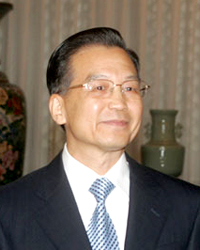
Image via Wikipedia
by Charles Lemos, Sat Mar 14, 2009 at 01:57:12 AM EST
In 2008, China's holdings of US debt grew 52.3%. All told, the Chinese bought $249.8 billion in US treasuries and now hold $727.4 billion surpassing Japan as the nation's largest lender. Today speaking at his annual press conference at the close of China's parliament, Chinese Premier Wen Jiabao said: "We have made a huge amount of loans to the United States. Of course we are concerned about the safety of our assets. To be honest, I'm a little bit worried."
Concerned, worried and increasingly blunt for this isn't the first time that the Chinese Premier has lectured US policymakers. Back in late January at the Davos World Economic Forum, he delivered a stinging rebuke of American capitalism calling it an "unsustainable model of development characterized by prolonged low savings and high consumption." Unfortunately, he does have a point.
From the story in the New York Times:
While refraining from direct criticism of the Obama administration's economic policies, he reminded Washington of China's status as its largest creditor. With budget deficits mounting rapidly, the United States needs China if it is to finance all that new debt at low interest rates.
"President Obama and his new government have adopted a series of measures to deal with the financial crisis. We have expectations as to the effects of these measures," Mr. Wen said. "We have lent a huge amount of money to the U.S. Of course we are concerned about the safety of our assets. To be honest, I am definitely a little worried."
He called on the United States to "maintain its good credit, to honor its promises and to guarantee the safety of China's assets." What he did not mention was that Chinese investments in the United States helped drive the debt-fueled boom of the last decade, during which China grew increasingly dependent on the American market -- a point that was driven home earlier this week when China reported a record 26 percent drop in exports in February.
He stopped short of any threat to reduce purchases of American bonds, much less sell any of them, underscoring the two countries' mutual dependency.
Some specialists say that China's investment in American debt is now so vast that it would be impossible for Beijing to unload its Treasury securities without flooding the market and driving down their price.
Still, it is rare for any world leader to raise questions about the safety of United States Treasuries. Both the White House and Treasury Department issued reassuring statements. Robert Gibbs, the White House press secretary, said, "There's no safer investment in the world than in the United States." Foreign investors would be reassured if Congress adopted the president's budget plan, he said, because it would put "us on that path to fiscal responsibility."
While economists dismiss the possibility of the United States defaulting on its obligations, they say China could face steep losses in the event of a sharp rise in United States interest rates or a plunge in the value of the dollar.
After giving the world lectures on economic stewardship all the while running current account deficits and budget deficits that were unsustainable, we are getting our comeuppance and there's little doubt that the world's economic playing field is vastly different than it was a mere 30 years ago. It should not escape you that we are here because the Republican Party, controlled by a powerful group of wealthy individuals and corporate leaders who were viscerally opposed to notions of a mixed economy, state planning and regulation, pursued a free market ideology that has not just made most of us poorer but now threatens our national security. We will regain a semblance of our financial independence if we chose to rebuild our manufacturing prowess, otherwise we may just have to listen every time Wen Jiabao speaks.
![Reblog this post [with Zemanta]](http://img.zemanta.com/reblog_a.png?x-id=1ac7998e-e06d-4d6a-ac62-81bac8b2e416)
No comments:
Post a Comment